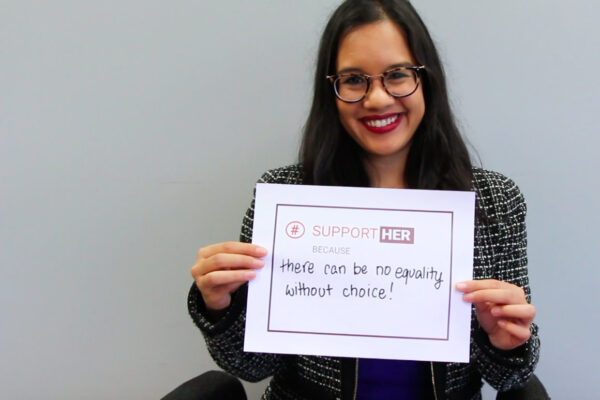To say that the last couple of months in American politics have been tough for reproductive freedom would be a gross and callous understatement.
With Brett Kavanaugh now firmly planted in the Supreme Court, the future of abortion rights appears uncertain. Unfortunately, the reproductive rights landscape in Texas was already bleak. In 2017 alone, lawmakers proposed 39 measures attacking abortion rights. Several of these bills became laws, including a ban on one of the most common and safest abortion methods.
We sat down with our newest attorney, Anjali Salvador, to discuss what the future holds for abortion rights in Texas, and what drives her passion in the fight for reproductive freedom.
What has been your educational and career trajectory prior to joining the Legal team at the ACLU of Texas?
I was born here in Texas and lived in Houston until I moved to Philadelphia to attend the University of Pennsylvania. I graduated with a bachelor’s degree in history and then moved to New York City, where I graduated from a joint degree program between Columbia Law School and the London School of Economics. I then spent almost three years as a litigation associate at a large law firm in New York City, and then another year clerking for a federal judge in Brooklyn.
What was it about the opportunity to work on reproductive rights issues with the ACLU of Texas that sparked your interest to pursue the position?
I’ve been interested in reproductive rights issues since I was a teenager when I first read Roe v. Wade for a project in high school. That made me start thinking about the relationship between empowering women—something that was always very important to me—and reproductive freedom.
As a law firm associate, I specifically sought out pro bono projects that focused on women. I worked on a case seeking special immigrant juvenile status for a girl who had survived physical and sexual abuse, a case that achieved a favorable settlement for a woman who had been sexually harassed by her employer, and another case that successfully got rid of our client’s unfair prostitution convictions, incurred because she was the victim of sex trafficking.
It has always been very clear to me that women are not going to achieve true social or economic equality without being able to make our own decisions about our sexual and reproductive lives. I am so excited for the opportunity to try to help make that happen.
Can you talk more about the work you are doing around reproductive rights?
We’re currently gearing up for the start of the Texas legislative session. The session begins in January 2019, but bills will be proposed before that. We’re having discussions both internally and with our coalition partners at other organizations about the types of bills that might be proposed. We suspect that many of the bills will be bad for reproductive rights, so we are strategizing about how to use our resources to fight them.
What does the reproductive rights landscape currently look like in Texas?
Texas is ground zero for oppressive restrictions on reproductive rights. These are just some of the hurdles that a woman must jump through in order to access a safe and legal abortion:
• A woman needing an abortion often has to travel long distances in order to obtain it. Over 200 counties in Texas have no abortion provider.
• Abortion can be expensive. With very narrow exceptions, Texas law forbids insurers from covering abortion as part of an overall health insurance plan.
• A woman who needs an abortion needs to make at least two trips to the abortion provider. The state requires her to have a sonogram and receive certain paperwork about medical risks, adoption alternatives, and development of the fetus—some of which contains wildly inaccurate information. The state also requires her to wait 24 hours after the initial appointment to have the abortion, which makes accessing abortion especially difficult if she lives far away or works multiple or inflexible jobs.
• A minor who needs an abortion is generally required to get consent from her parents, although there is an exception if she gets a judge’s permission to have the abortion without parental consent. A few years ago, the Texas legislature changed the law to make it easier for judges to deny these requests.
What issues or legislation do you anticipate arising during the 2019 Texas legislative session?
The Texas State Legislature, in large part, is hostile to reproductive freedom, and I anticipate that things will get even worse during the 2019 session. I think there will be a deliberate, multi-pronged attack on abortion, particularly since we have a president who has just appointed a justice to the Supreme Court who has historically been opposed to abortion access.
What kind of impact will proposed anti-abortion legislation have on women’s lives in Texas?
Restrictions on abortion are bad for women. When a woman wants to get an abortion but is denied, research shows that she is more likely to live in poverty and less likely to have a full-time job. Texas already makes it extremely hard for a woman to access an abortion; if it gets harder, even more women are going to suffer.
Do you have any thoughts on the future of reproductive rights at the federal level?
One question is whether the court will overturn Roe v. Wade. That’s a legitimate worry, but a Supreme Court hostile to reproductive rights wouldn’t need to overturn Roe to make it virtually impossible for a woman to get an abortion. All it would have to do is uphold the increasingly draconian restrictions that states already impose on women who need access to an abortion.
Donald Trump has seated over 80 federal judges during his time as president. These are the people who will be evaluating restrictions on reproductive rights. While litigation will continue to be important, a lot of the fight for reproductive rights will have to happen outside of the courts—in communities, in state legislatures—in order to be successful.
What can people do to #SupportHer and pro-reproductive rights legislation? The ACLU of Texas currently has a #SupportHer campaign aimed at promoting the idea that a woman who has already made the decision to end a pregnancy needs support and access to safe medical care.
People should visit the #SupportHer website to learn the facts about abortion and ways they can talk more openly with friends and family about it. The ACLU of Texas website also has Know Your Rights information about abortion, which is legal in Texas. People can also sign up to volunteer and receive updates on our reproductive rights work and how to take action when those rights are under attack.
This embed will serve content from {{ domain }}.
See our privacy statement


